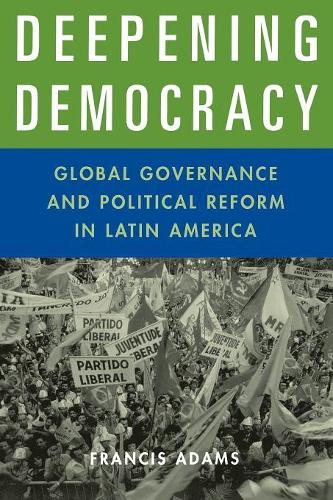
Deepening Democracy: Global Governance and Political Reform in Latin America
(Paperback)
Available Formats
Publishing Details
Deepening Democracy: Global Governance and Political Reform in Latin America
By (Author) Francis Adams
Bloomsbury Publishing PLC
Praeger Publishers Inc
30th May 2003
United States
Classifications
Tertiary Education
Non Fiction
Political structure and processes
Non-governmental organizations (NGOs)
320.98
Physical Properties
Paperback
184
Description
This text offers a survey of the impact of transnational organizations and NGOs on Latin American politics since 1990. The transition from military to civilian rule in Latin American countries has benefited local progressive forces, but resilient remnants favouring the past's authoritarian politics have compelled organizations like the UN, IMF, OAS, and World Bank to engage in various campaigns to deepen democratic institutions and norms. Adams argues that to understand current political transformations in the region, one must consider the existing role of external organizations. Latin America is offered as a prime example of the increased influence transnational authorities have over political decisions that had long been the exclusive prerogative of national governments. Beginning with the Latin American experience, Adams reviews the contemporary character of power and politics in the area, outlining how democratic transitions have been limited. UN human rights and reform initiatives are considered. Adams scrutinizes the work of the World Bank, the IMF, and the Inter-American Development Bank to modernize public administration, strengthen political institutions, enhance transparency and accountability, and fortify civil society. He also examines the work and impact of the Organization of American States and various global citizens groups.
Reviews
The author's underlying assumption is that democratic change is only possible and sustainable through grassroots participation. Democracy is understood here as driven by competitive politics, but participatory democracy and representative democracy offer ways to achieve reforms. Adams focuses on assessment of reform initiatives carried out by transnational organizations in Latin America since 1990....Recommended. Upper-division undergraduates and above.-Choice
"The author's underlying assumption is that democratic change is only possible and sustainable through grassroots participation. Democracy is understood here as driven by competitive politics, but participatory democracy and representative democracy offer ways to achieve reforms. Adams focuses on assessment of reform initiatives carried out by transnational organizations in Latin America since 1990....Recommended. Upper-division undergraduates and above."-Choice
Author Bio
FRANCIS ADAMS is Assistant Professor of Political Science and Geography at Old Dominion University, Norfolk, USA.
